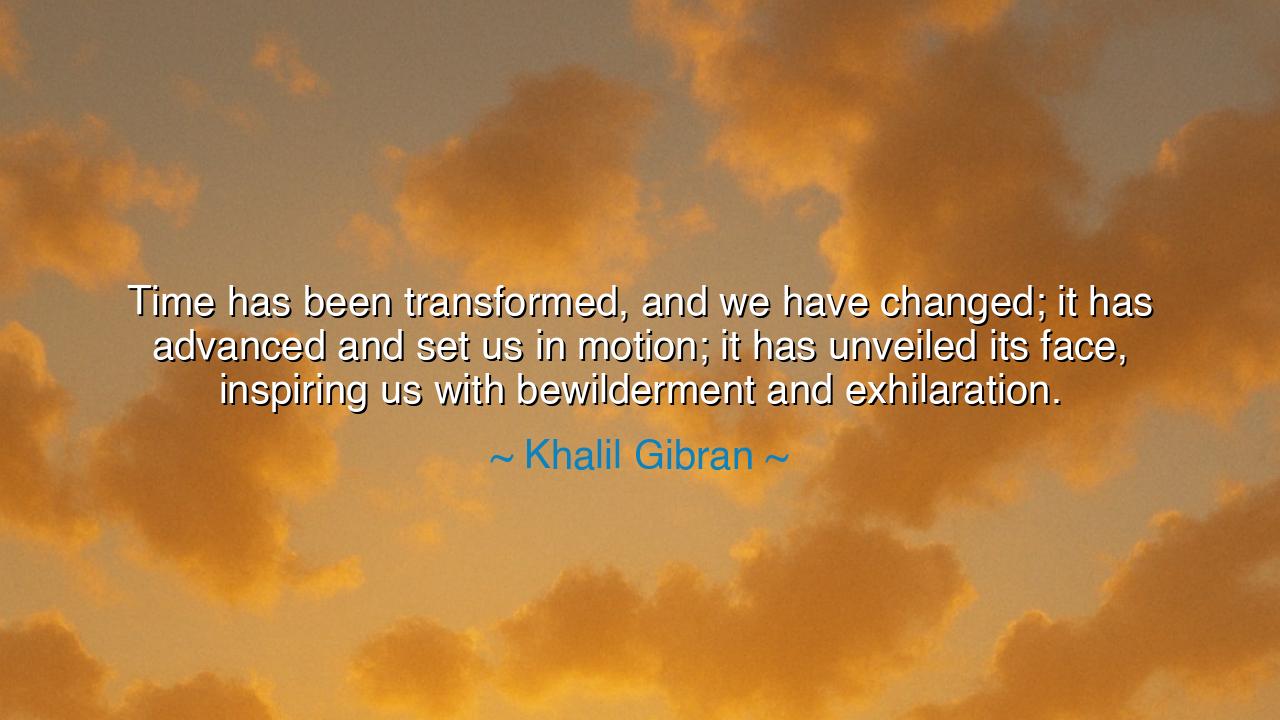
Time has been transformed, and we have changed; it has advanced
Time has been transformed, and we have changed; it has advanced and set us in motion; it has unveiled its face, inspiring us with bewilderment and exhilaration.






The poet of the soul, the seer of Lebanon, Khalil Gibran, once spoke words that shimmer like fire and mist: “Time has been transformed, and we have changed; it has advanced and set us in motion; it has unveiled its face, inspiring us with bewilderment and exhilaration.” In this utterance, he reveals the great truth that time is not static, nor are we. It is a river that reshapes its banks, a force that does not merely pass but transforms all who dwell within it. To live is not to remain the same, but to be carried forward by time’s current, bewildered at its mysteries, yet exhilarated by its unfolding revelations.
The origin of this reflection lies in Gibran’s deep meditations on life, change, and the eternal. In his writings—particularly in works such as The Prophet—he often spoke of human beings as travelers upon the road of existence, shaped by unseen forces, lifted and lowered by the tides of destiny. Here, he acknowledges that time is not merely a measure of passing hours; it is a living teacher, unveiling its face little by little, and in doing so, awakening us to both awe and transformation. Time changes us, even as it reveals itself.
The ancients too pondered this truth. Heraclitus declared that no man steps into the same river twice, for both man and river are in flux. Likewise, the Hebrew psalmist proclaimed that “the days of our years… are soon cut off, and we fly away,” seeing life as motion rather than permanence. Gibran’s words stand within this ancient lineage, but with his own fire: he calls us not only to recognize the inevitability of change but to embrace its bewilderment as a source of exhilaration.
History gives us luminous examples. Consider the dawn of the Renaissance. For centuries, Europe had slumbered in the long shadow of the Middle Ages. Yet as time advanced, it unveiled its face—new philosophies, new art, new science. Men like Leonardo da Vinci and Michelangelo stood in awe and joy before the bewildering transformations of their age, lifted into motion by time itself. What seemed chaos to some became revelation to others, and from this unveiling came a rebirth that still inspires the world.
The meaning of Gibran’s words is therefore both humbling and empowering. Time does not ask our permission to change us; it does so with or without our consent. Yet in this transformation lies possibility. To resist time is to be broken by it; to flow with it is to be carried into new realms of growth. Bewilderment is not to be feared, but to be welcomed, for it is the sign that time is unveiling mysteries beyond our comprehension. Exhilaration, too, is its gift, for each revelation reminds us that life is not stagnant but alive.
The lesson, then, is clear: embrace the transformations of time. Do not cling desperately to what was, nor shrink in fear before what is to come. Instead, open yourself to the unveiling face of time. Let bewilderment become wonder, and let change become the seed of renewal. For in the motion of time, there is always an invitation—to grow, to learn, to be remade. The true strength of man is not in resisting change, but in being exalted by it.
In practice, I counsel this: when life shifts—when seasons end, when opportunities fade, when new paths open—do not despair. Pause, acknowledge your bewilderment, and then lean into the exhilaration of becoming. Keep journals of your growth, so you may see how time’s hand has shaped you. Seek out wisdom not to stop time, but to walk with it. In every transition, ask: “What is time teaching me now?” In this way, you live not against time but in harmony with it.
Thus, remember the eternal wisdom of Khalil Gibran: “Time has been transformed, and we have changed.” Let his words awaken you to the majesty of motion, to the unveiling of mysteries, to the awe that is both bewildering and exhilarating. For time is not your enemy, but your guide—and if you follow it with courage, it will carry you not into despair, but into the fullness of becoming.






AAdministratorAdministrator
Welcome, honored guests. Please leave a comment, we will respond soon